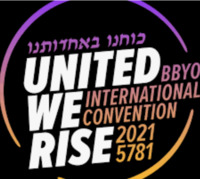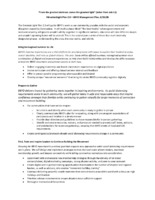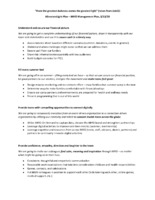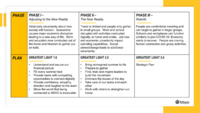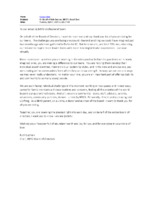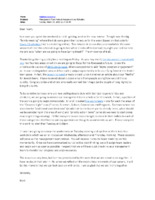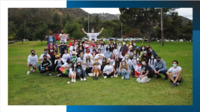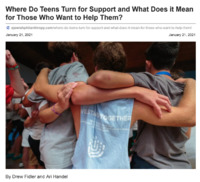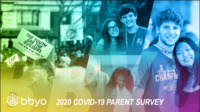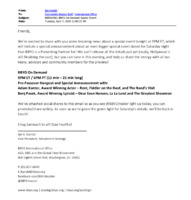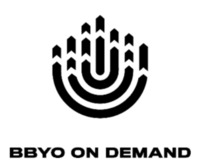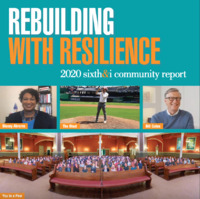Items
The items below are from collecting projects that have partnered with RRCHNM or given permission to index their collections. You can see even more items that have been collected during the pandemic by browsing the websites of specific collecting projects.
-
BBYO International Convention 2021 (1)
Flyer for BBYO's international convention. The event will be held through an online platform and will be available to Jewish teens around the world. -
BBYO Management Plan, Greatest Light Plan 2.0
An updated plan for BBYO's future reflecting their second phase of the pandemic. The goals take COVID-19 precautions into consideration when planning future in-person events. The plan expands on the first version as well as adds other areas of focus such as mental health. -
BBYO Management Plan, Greatest Light 1.0
Overview of BBYO plans and focus for the future. Areas of focus include finance and budget, plans for upcoming summer camp, and transition from in-person programming to BBYO On Demand, an online platform. -
BBYO: Three COVID Phases
The slides presentation demonstrates three phases of the pandemic that BBYO has and is preparing for. Each phase has a brief description and a plan for BBYO to tackle. The first phase is the initial quarantine period, the second phase is when society is feeling the effects of the pandemic, and the third phase is the post-pandemic world. -
BBYO launches Jewish 'Netflix' for live-streamed teen programming
An article on BBYO On Demand shortly after its launch in March 2020. The online platform offers on demand content for Jewish teens around the world in addition to watch parties and study halls. The VP of global strategy at BBYO, Ian Kandel, is looking forward to figuring out new and creative content to add to the platform. -
BBYO: On Behalf of Ruth Suzman, BBYO's Board Chair
An email from the BBYO Board Chair to the professional team thanking them for their work during the pandemic transitional period. -
BBYO: Wellness and Inclusion Advisory Council events
Flyer for two events for BBYO parents to attend. The events are focused on preparing parents for a post-pandemic world when teens return to school and normalcy. -
Management Team Retreat Assignment and Schedule
The email was sent to the BBYO administration team shortly after going into quarantine in March 2020. The email thanked the team for their cooperation and informs them on next steps. Instructions were given to complete worksheets on five different areas and what they should consider for the future. -
BBYO: June 1st All Staff Call
A series of pictures from events that BBYO held both in-person and virtually. A few of the slides include positive comments from parents of teens who attended events. Some pictures are of Zoom calls with fun backgrounds and masked teens playing games outside. -
BBYO: Culture Credo
A flyer of BBYO's values and mission as a Jewish organization that is there to serve Jewish teens. The values are what drive BBYO and remind its members that the organization is meant for them and it a fun and safe space. -
Where Do Teens Turn for Support and What Does it Mean for Those Who Want to Help Them?
The article talks about the results of a survey that BBYO conducted on its teen audience and members in order to gauge mental health needs during the pandemic. BBYO used the survey's results as well as mental health resources to focus on three areas: teen training on wellness, establish wellness support teams, and review of BBYO's internal practices in wellness. -
When is the Right Time to Return to In-Person Programming
The article, written by Vice President of IT Strategy and Measurement at BBYO, Karen Alpert, summarizes the main takeaways from a 2020 BBYO survey sent to parents of members. The survey focused on questions regarding parents' opinions on resumption of in-person programming, on BBYO's response to the pandemic, and the financial impact on families. -
BBYO: 2020 COVID-19 Parent Survey
The results to a survey sent out to parents of BBYO members across the country show that overall (72%), parents are not comfortable with in-person programming. The survey also asked questions regarding opinions on BBYO's response to the COVID-19 pandemic and the financial impact that the pandemic has on Jewish families with teens. -
BBYO: Chapter and Community Program Ideas
BBYO offers a list of ideas for its chapters to engage members whether online, in person, or both. The list includes projects and activities for both large communities and small chapters to undertake. The document makes sure to list activities that can be conducted through Zoom or hybrid options as well. -
BBYO On Demand Special Event
Email notifying BBYO community of special event happening with actor Adam Kantor and lyricist Benj Pasek. The event will include a special announcement in which the guests will announce to those watching on the platform. The document contains details of the event as well as encouragement to share the event on social media. -
BBYO On Demand
BBYO digital platform that hosts events to connect Jewish teens around the world. Events and conferences focus on themes of leadership. The page regularly updates the programs that BBYO is offering virtually for teens. -
Information on BBYO On Demand
This flyer provides information on BBYO's digital space created in the wake of the COVID-19 pandemic. The document highlights some events that were hosted on the platform. -
BBYO COVID-19 Advisor Update
The text highlights "BBYO On Demand", a digital space created in the wake of the pandemic in order to connect Jewish teens to activities and events held by BBYO. The document outlines different roles BBYO advisors can take within the space, such as a "content creator" and a "content facilitator". -
Jewish Law and Ethics: a hackathon for the age of COVID-19
The human rights organization, T'ruah, challenged eight Jewish scholars to find answers to four ethical questions brought on by the COVID-19 pandemic. The scholars were asked to source materials on Jewish law and ethical practice to find ways to navigate these ethical problems which include questions of evication and worker's rights. -
Hebrew College's response to coronavirus
Hebrew College updates its students and staff on an updated policy in response to the Delta Variant of COVID-19. As of August 20, 2021, all students, staff, faculty, renters, and visitors are required to wear masks when in the building regardless of vaccination status. Additionally, all students and faculty must also show proof of vaccination. -
Sixth & I Community Impact Report
This report captures the challenges and triumphs of trying to fulfill Sixth & I's mission during a pandemic and illustrates how community support and participation made it all possible. -
Is This Passover Really Different
Rabbi Yehuda Ceitlin Is this Passover Really Different? This Passover, Jews around the world are asking the question, "Why is this Passover different from all others?". Some humorously reply, "Don't ask." In Israel, there are advertisements that respond less whimsically, instructing, "This year we all stay home." This year, instead of gathering with our loving grandparents, we are told to love them "from a safe distance." This year, instead of celebrating with all friends and family, we are told to stay within our own households. This year, instead of getting out and having fun over the middle days of the holiday, we are told to skip the leisure trips and leave off visiting parks. The "Stay Home - Stay Alive" rule will be practiced by Jewish people in the U.S. and around the world, as the global pandemic continues to threaten our health and our lives. But is this night really different? If we look back at the very first Passover, this description may sound very similar. On that fateful night, the 15th of Nissan, 3332 years ago, our people were instructed to remain in their homes in isolation for their safety. Outside, there was a raging plague killing people. And that is how the tradition of Passover began. G-d passed-over the Jewish homes during the 10th and final plaque, punishing the Egyptians for decades of enslaving, torturing and killing the Jews. Passover is called the Festival of our Freedom, but in reality, it is the ultimate celebration of faith. It is the story of how our people remained optimistic when the future seemed hopeless and trusted in G-d even when they felt He had forsaken them. And though G-d has not spared the Jews from this COVID-19, nor has He told us why humanity is being assaulted with these devastating blows, He is the one behind this wheel as He is behind all others. Our faith brought us salvation during the first Passover in isolation and we pray that it brings salvation to the world during our upcoming Passover in isolation. -
A Passover Prayer
Rabbi Robert Eisen of Congregation Anshei Israel (now retired) discusses what prayers are needed to escape the "Egypt" of the pandemic. A PASSOVER PRAYER Depending upon the final publishing schedule, this piece will appear either immediately before we conclude our observance of Passover, or immediately after. And, though we might feel different about ourselves and this world we find ourselves living in before or after the end of our festival observance, I would venture to guess that we will all share one thing in common: a prayer that this year our prayers really will be answered! True, the “Egypt” that we are experiencing is different from that of our ancestors. Yet, that we have been “groaning,” “crying out for help,” “moaning,” each in our own way, and collectively, cannot be denied. We find ourselves in a place of “narrowness” (a word that is similar to a core meaning which can be derived from the Hebrew: MITZRAYIM - Egypt) ... a place where we have been, in some ways, cut off from those, and that, which mean the most to us. And, as we read in the HAGGADAH, we want only to be brought out from this slavery to freedom, from this despair to joy, from this mourning to celebration, from this darkness to light, from this enslavement to redemption so that we can sing before God a new song: HALLELUYAH. What will it take? How will we get there? Social distancing and following the guidelines of the CDC is a start … and absolutely necessary. However, in order to get through this we need to do one more thing: we need to embrace it for what it is … with a prayer. As God prepared to take our ancestors out of Egypt, as a prelude to the 10th plague (the killing of the first-born), the people were told to put blood on their doorposts. Why? Was the Angel of Death that “challenged” that he had to look and see if the house was of the Hebrews or not? NO! The people were directed to place the blood on the doorposts to teach them that they would be saved only to the extent that they participated in that process … in order to be redeemed, they needed to work to redeem themselves. What does that take? What is the equivalent for our day? To start: A prayer … a recognition that there is that which is greater than us (individually and/or collectively), and that there will be a time after this when we will be able to live life to the fullest once again. A prayer … that we will find the strength to reach out to others the way we expect God to be reaching out to us. A prayer … that we will continue to see beyond the present moment. A prayer … that we will have the hope and the faith to remember that better days do lie ahead. Will we ever return to what we used to have as normal? Other than trying not to take some things that we used to for granted I do believe that we will. For our ancestors the wilderness was at times as trying as Egypt, but they continued to step forward because they knew there was a Promised Land. Let us pray that we can and will do the same. Stay safe … Stay well … B’VIRKAT SHALOM -
Love Your Neighbor in 8 Easy Steps
Rabbi Israel Becker of Congregation Chofetz Chayim in Tucson, Arizona, explores why the sage Hillel changed the connotation of "love your neighbor" from a positive action to "That which is hated to you, do not do to your friend." Love Your Neighbor in 8 Easy Steps There is a famous story in the Talmud about how someone asked the great sage Hillel to teach him the whole Torah while standing on one foot. The Maharsha commentary (Rabbi Shmuel Eidels, 1555-1631) explains that the question was not facetious. The questioner wanted to know if there is one fundamental principle that connects to the entire Torah. Hillel responded, "That which is hated to you, do not do to your friend." The Talmud commentaries explain that Hillel was referring to the Torah commandment "Love your neighbor as yourself" (Leviticus 19:18). The centrality of love your neighbor was echoed several generations later by Rabbi Akiva, who taught that love your neighbor is a major principle that permeates the entire Torah. The obvious question that many commentators ask is, "Why did Hillel change the explicit connotation of the verse, which was presented with the positive (to actively love)?" Rabbi Dovid Tzvi Hoffman (1843-1921) explains that Hillel is actually presenting to us a tangible way to fulfill the mitzvah of love your neighbor. Hillel reveals to us that the commandment of generating love is not one of quantity, but one of quality. If you could measure the amount of love a person generates for himself, the normal human will certainly love himself more than his neighbor. For example, when a person looks at a group photo, the first person they notice is themselves. Are most human beings violating, then, love your neighbor as yourself? G-d is asking us to strive to generate more and more love for our neighbor. But He does not expect us to go beyond the scope of what a human is capable of. What G-d demands of us is to provide the same quality of human interaction that we would want for ourselves. Hillel is also teaching us that love your neighbor is not an abstract emotion. Love your neighbor is fulfilled by translating the emotion into concrete action. Rabbi Yaakov Tzvi Mecklenburg (1785-1865), in his famous Haketav VehaKabbalah, provides eight steps to fulfill love your neighbor as yourself. He explains that “as yourself” teaches not that we are obligated to give everything we have to the next person, because that is not what we expect the next person to give to us. Love as yourself means to do to him what you would want to be done to yourself, and not to do to him what you would not want to be done to yourself. Rabbi Mecklenburg gives eight concrete very human examples of how to love your neighbor: 1. Be truthful. 2. Treat him with dignity. 3. Ask how he is faring. 4. Respond to his pain. 5. Greet him in a friendly way. 6. Judge him favorably (by giving him the benefit of the doubt). 7. Extend yourself when he asks for a small favor. 8. Let him borrow from you something that he needs. Hillel's response to the questioner, which is recorded in the Talmud for all time, actually provides for us a tangible way to perform a mitzvah that we might feel is otherwise beyond our reachable ability, attainable only to a few select super-holy individuals and not something that every single one of us can apply constantly. These steps may seem small and trivial, but Hillel is teaching us that small steps enhance G-d's world in a powerful way. -
Empathy in a Time of Pandemic
Reflection by Rabbi Helen Cohn of Congregation M'kor Hayim in Tucson on the challenge of practicing empathy, of the Mussar middot, during the pandemic. Empathy in a time of Pandemic Mussar is the Jewish practice of character refinement, based on working with specific traits called middot (sing., middah). Our congregation has two Mussar groups who work with a middah for two weeks at a time. Last December we created the list of middot for 2020, months before COVID-19. However, each trait during the past several months has been surprisingly fitting for our unique situation, including the current middah, Empathy. The English words Empathy and Compassion are often defined slightly differently. Empathy means sympathetically feeling oneself in another’s position; Compassion means doing something specific because of a feeling of empathy. As we huddle in place, our ability to act in an empathic way is greatly limited. Yes, we are touched and inspired by acts of generosity and kindness that we hear about, and the actions that some of us do here in our own community. But we also personally feel our many constraints. Our Jewish texts offer guidance for caring for someone who is ill. This is one of my favorite examples: One of the students of Rabbi Akiva became ill. The Sages did not visit him, so Rabbi Akiva visited him. He swept and cleaned the floor, and the student recovered. The student said, “My teacher, you revived me.” Rabbi Akiva then taught: anyone who does not visit the ill, it is as if that person is spilling blood. (B. Talmud, Nedarim 40b) Interpretation: it could be the sick person has no one caring for him, and if he has no visitors, no one will know his situation and therefore no one will come to his aid. But our situation is exactly the opposite: we cannot (under most circumstances) visit the ill. We cannot even visit a person who needs consolation because of fear, anxiety, or being in a period of mourning. What, then, can we do? How can Empathy guide our behavior? We might ask: What do we want from others, as we isolate in our own homes? Perhaps looking with empathy at our own situation we will be guided to see what we can do for others.
